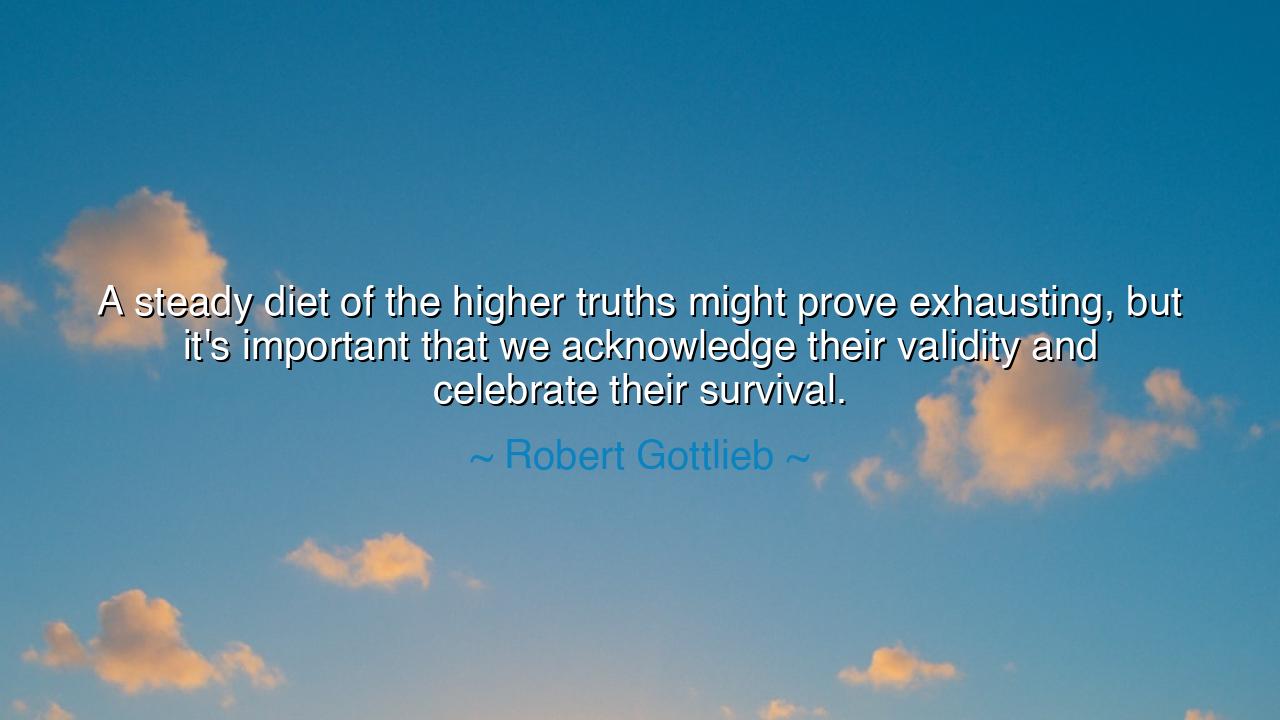
A steady diet of the higher truths might prove exhausting, but
A steady diet of the higher truths might prove exhausting, but it's important that we acknowledge their validity and celebrate their survival.






In the journey of life, there are truths that echo through the ages, truths so profound and powerful that they shape the very fabric of existence. Yet, as Robert Gottlieb so eloquently puts it, "A steady diet of the higher truths might prove exhausting, but it's important that we acknowledge their validity and celebrate their survival." This statement speaks to the weight of profound wisdom, a burden often too heavy to bear continuously, yet one that must be acknowledged, celebrated, and passed down through the generations. For even the highest of truths, those that transcend time and circumstance, can feel overwhelming when faced with constantly, but their survival is what sustains the spirit of humanity itself.
In the time of the ancients, wisdom was not easily attained. The Greek philosophers, such as Socrates and Plato, sought truth not just as a fleeting concept, but as a lifelong pursuit—a pursuit that required sacrifice, reflection, and a willingness to endure difficult realizations. Socrates, in his dialogues, often led his followers through questions and trials that uncovered painful truths about human nature, society, and existence. These truths, though often difficult, were not to be avoided. They were to be faced with courage and examined deeply, for it was through them that the soul could elevate itself, rising above the superficialities of the world to grasp something more eternal. Gottlieb’s words echo this ancient wisdom: while the higher truths may sometimes feel like a burden, it is essential to acknowledge them and honor their survival, for it is through their survival that we, too, are shaped.
In the life of Aristotle, we see this pursuit of higher truths through discipline and commitment. Aristotle believed that the philosopher's life was not one of idle speculation but of action grounded in the deep contemplation of truth. To live a life of virtue, he argued, was to understand the fundamental principles of existence and apply them in daily life. These principles—often abstract and intense—were not to be feared but celebrated. Much like Gottlieb’s reflection, Aristotle recognized that such wisdom, while potentially exhausting to contemplate, formed the foundation of a meaningful life. We, too, must celebrate the survival of higher truths by embodying them in our actions, not merely acknowledging their existence from a distance but integrating them into the way we live, love, and understand the world.
Consider the story of Diogenes, the ascetic philosopher who lived in a barrel and sought to challenge the status quo with his radical understanding of truth. Diogenes mocked the pretensions of society, using humor and paradox to reveal the higher truths that most people were too afraid to confront. Diogenes knew that society’s comforts often masked the deeper realities of existence—truths that were uncomfortable, yet essential. His life was a testament to the idea that the higher truths of life might seem exhausting or difficult to bear, but they are necessary if we are to live in accordance with the true nature of the world. In the same way, Gottlieb calls us to acknowledge and celebrate these truths, even when they challenge our comfort or the status quo.
In Buddhism, we find a similar teaching: the path to enlightenment is not one of comfort but of profound realization. The Buddha’s teachings on the Four Noble Truths address the inherent suffering in life—truths that, when first heard, may seem unbearable. Yet, the very acceptance of these higher truths is the path to freedom, peace, and understanding. The Buddha did not shy away from the discomfort these truths might cause. Instead, he taught his followers to embrace them, for only in facing the harsh realities of existence could one transcend them and achieve peace. Gottlieb’s statement echoes this wisdom—while the higher truths may feel overwhelming, it is only by confronting them that we can find clarity and spiritual freedom.
Thus, we arrive at the central lesson: while the higher truths of life may be difficult to bear, they are not to be feared or ignored. Gottlieb teaches us that we must, instead, acknowledge them with respect and celebrate their survival. These truths—whether about human nature, the impermanence of life, or the depth of suffering—have endured across millennia because they are fundamental to our understanding of existence. Truth, though at times burdensome, is the light by which we navigate the world, and it is through our embrace of this light that we gain the clarity and strength to live well.
In your own life, strive to recognize the higher truths—the difficult, uncomfortable ones that challenge your perceptions. Rather than turning away from them, welcome them with the wisdom of the ancients. Understand that they are not obstacles but beacons guiding you toward deeper wisdom. Let them shape the way you act, the way you love, and the way you live. Celebrate their survival, for in them lies the power to transform your life and the lives of those around you. Embrace these higher truths, not as burdens, but as the stepping stones to a more profound and meaningful existence.






AAdministratorAdministrator
Welcome, honored guests. Please leave a comment, we will respond soon